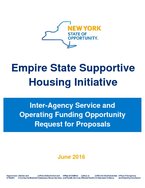0
Report
Community:
Jan 1, 2019
This report focuses on the homelessness and health care use of older homeless adults in New York City, specifically those 55 years of age or older. Recent evidence suggests a unique cohort effect of postWorld War II “baby boomers” born between 1955 and 1965 who have shown a disproportionately high
risk of homelessness over the last two decades.
Authored by: Dennis Culhane, Dan Treglia, Randall Kuhn, Kelly Doran, Eileen Johns, and Maryanne Schretzman for Actionable Intelligence for Social Policy
Topics: Cost effectiveness, East Coast, Health, Homelessness, Housing, Low-income, Research, Seniors
 Shared by Housing Is
Shared by Housing Is
Housing Is posted a
on Apr 11, 2019
Dennis Culhane, Dan Treglia, Randall Kuhn, Kelly Doran, Eileen Johns, and Maryanne Schretzman for Actionable Intelligence for Social Policy
This report focuses on the homelessness and health care use of older homeless adults in New York City, specifically those 55 years of age or older.
0
Report
Community:
Jan 1, 2019
This report is intended to accompany a report entitled The Emerging Crisis of Aged Homelessness: Could Proposed Housing Solutions Be Funded from Avoidance of Excess Hospital and Nursing Home Costs?, which reports on findings from a multi-site study involving the analysis of data from Boston, Los Angeles and New York City. That report is motivated by recent evidence documenting a cohort effect in the single adult homeless population, wherein persons born between 1955 and 1964 have faced a disproportionate risk of homelessness over the past two decades.
Authored by: Thomas Byrne, Daniel Miller, and Jae Quinn for Actionable Intelligence for Social Policy
Topics: Cost effectiveness, East Coast, Health, Homelessness, Housing, Low-income, Research, Seniors
 Shared by Housing Is
Shared by Housing Is
Housing Is posted a
on Apr 11, 2019
Thomas Byrne, Daniel Miller, and Jae Quinn for Actionable Intelligence for Social Policy
This report is intended to accompany a report entitled The Emerging Crisis of Aged Homelessness: Could Proposed Housing Solutions Be Funded from Avoidance of Excess Hospital and Nursing Home Costs?, which reports on findings from a multi-site study involving the analysis of data from Boston, Los Ang
0
Publication
Community:
Could Housing Solutions be Funded by Avoidance of Excess Shelter, Hospital, and Nursing Home Costs?
Authored by: Actionable Intelligence for Social Policy
Topics: Cost effectiveness, Health, Homelessness, Housing, Legislation & Policy, Research, Seniors
 Shared by Housing Is
Shared by Housing Is
Housing Is posted a
on Apr 11, 2019
Actionable Intelligence for Social Policy
Could Housing Solutions be Funded by Avoidance of Excess Shelter, Hospital, and Nursing Home Costs?
0
Research
Community:
Mar 20, 2019
Launched in 2016, the Denver Supportive Housing SIB aims to support residents struggling with homelessness, substance use, and mental health problems by increasing the number of people getting and staying housed and reducing the number of days they spend in jail. The permanent supportive housing model combines a permanent housing subsidy with wraparound services, such as mental health counseling, to help people improve their stability. In Denver, MHCD and the Colorado Coalition for the Homeless (CCH) were selected to offer these services as part of the SIB.
Authored by: The Urban Institute
Topics: Cost effectiveness, Criminal justice, Homelessness, Housing, Low-income, Pacific Northwest, Partnerships, Research, Substance abuse
 Shared by Mica O'Brien
Shared by Mica O'Brien
Mica O'Brien posted a
on Mar 26, 2019
Launched in 2016, the Denver Supportive Housing SIB aims to support residents struggling with homelessness, substance use, and mental health problems by increasing the number of people getting and staying housed and reducing the number of days they spend in jail.
0
News Article
Community:
Jan 25, 2019
A whole host of factors — such as friends, housing and transportation — affect a person’s health and how much they need the social safety net. It’s time the government’s big health insurance programs took this reality into account, some lawmakers and policymakers are starting to argue.
Authored by: Paige Winfield Cunningham for The Washington Post
Topics: Asset building, Cost effectiveness, Disabilities, Education, Food insecurity, Funding, Health, Homelessness, Housing, Legislation & Policy, Low-income, Medicaid / Medicare, Seniors, Transportation, Workforce development
 Shared by Housing Is
Shared by Housing Is
Housing Is posted a
on Jan 25, 2019
Paige Winfield Cunningham for The Washington Post
A whole host of factors — such as friends, housing and transportation — affect a person’s health and how much they need the social safety net. It’s time the government’s big health insurance programs took this reality into account, some lawmakers and policymakers are starting to argue.
0
News Article
Community:
Dec 10, 2018
As state and federal officials increasingly search for ways to curb rising health care costs, a decades-old idea is gaining traction: helping people with challenges that have nothing to do with medical care but everything to do with their health.
Authored by: Misty Williams for Roll Call
Topics: Cost effectiveness, Food insecurity, Health, Homelessness, Housing, Low-income, Medicaid / Medicare, Nutrition, Partnerships, Preventative care, Stability, Transportation
 Shared by Mica O'Brien
Shared by Mica O'Brien
Mica O'Brien posted a
on Dec 10, 2018
Misty Williams for Roll Call
As state and federal officials increasingly search for ways to curb rising health care costs, a decades-old idea is gaining traction: helping people with challenges that have nothing to do with medical care but everything to do with their health.
0
Research
Community:
Nov 7, 2018
Does a screening requirement for homeless families seeking shelter create unintended costs? In 2012, Massachusetts passed a law requiring homeless families seeking shelter to prove that they had recently stayed somewhere not meant for human habitation. Hospital emergency department discharge paperwork can provide such proof. This study explored the trends of emergency department use for shelter by homeless youth before and after the eligibility criteria was passed into law and to measure the financial impact it had on the health care system. Researchers conducted a retrospective analysis of deidentified medical records of homeless children and young adults from birth to age 21 seeking shelter at a pediatric emergency department in Boston from 12 months before the eligibility rule to four years after the rule went into effect. They analyzed the number of visits, length of stay, insurance claims, and hospital charges before and after the policy change. Researchers found a significant increase in emergency department use for homelessness after the policy change. The results indicate that policymakers should consider the potential unintended health care costs of shelter eligibility policies and identify housing strategies that can prevent emergency department visits by families experiencing homelessness.
Authored by: American Journal of Public Health
Topics: Cost effectiveness, East Coast, Health, Homelessness, Housing, Legislation & Policy, Low-income, Research, Youth
 Shared by Mica O'Brien
Shared by Mica O'Brien
Mica O'Brien posted a
on Nov 8, 2018
American Journal of Public Health
Does a screening requirement for homeless families seeking shelter create unintended costs? In 2012, Massachusetts passed a law requiring homeless families seeking shelter to prove that they had recently stayed somewhere not meant for human habitation.
0
Report
Community:
Oct 24, 2018
CLPHA’s Housing Is Initiative is engaged in a number of cross-sector activities focused on developing partnerships, facilitating a community of practice, resource development, promoting best practices, online collaboration, policy and advocacy, and training and education. Read about recent activities in this Fall Update.
Authored by:
Topics: Child welfare, CLPHA, Community development, Cost effectiveness, Data sharing, Early childhood, Education, Family engagement, Funding, Health, Homelessness, Housing, Low-income, Medicaid / Medicare, Mental health, Partnerships, Place-based, Post-secondary, Research, Stability, Substance abuse, Workforce development, Youth
 Shared by Mica O'Brien
Shared by Mica O'Brien
Mica O'Brien posted a
on Oct 24, 2018
CLPHA’s Housing Is Initiative is engaged in a number of cross-sector activities focused on developing partnerships, facilitating a community of practice, resource development, promoting best practices, online collaboration, policy and advocacy, and training and education.
0
Report
Community:
Aug 9, 2018
The Colorado Coalition for the Homeless created the Denver Housing First Collaborative (DHFC) in 2003 with funding provided by a collaboration of federal agencies. The DHFC involved CCH as the lead agency, Denver Department of Human Services (DDHS), Denver Health (DHHA), Arapahoe House, the Mental Health Center of Denver (MHCD) and the Denver VA Medical Center. The DHFC is designed to provide comprehensive housing and supportive services to chronically homeless individuals with disabilities. Initial federal funding created the capacity to house and serve 100 chronically homeless individuals. The program uses a housing first strategy combined with assertive community treatment (ACT) services, providing integrated health, mental health, substance treatment and support services.
Authored by:
Topics: Cost effectiveness, Funding, Health, Homelessness, Housing, Pacific Northwest, Partnerships, Research, Stability, Supportive housing
 Shared by Housing Is
Shared by Housing Is
Housing Is posted a
on Aug 9, 2018
The Colorado Coalition for the Homeless created the Denver Housing First Collaborative (DHFC) in 2003 with funding provided by a collaboration of federal agencies.
0
Policy Brief
Community:
Aug 9, 2018
Everyone needs safe, decent, stable housing. For some of the most vulnerable people in America — people with mental illness, chronic health conditions, histories of trauma, and other struggles — a home helps them to get adequate treatment and start on the path toward recovery. But some conditions make it difficult for people to maintain a stable home without additional help. Supportive housing, a highly effective strategy that combines affordable housing with intensive coordinated services, can provide that needed assistance.
Authored by:
Topics: Cost effectiveness, Disabilities, Health, Homelessness, Housing, Low-income, Medicaid / Medicare, Mental health, Place-based, Seniors, Supportive housing
 Shared by Housing Is
Shared by Housing Is
Housing Is posted a
on Aug 9, 2018
Everyone needs safe, decent, stable housing. For some of the most vulnerable people in America — people with mental illness, chronic health conditions, histories of trauma, and other struggles — a home helps them to get adequate treatment and start on the path toward recovery.
0
Research
Community:
Aug 1, 2018
We sought to learn more about how state- and locally funded rental
assistance programs were created, how they are structured, whom they serve, and how they are funded.
Authored by:
Topics: Cost effectiveness, Data sharing, Disabilities, Family engagement, Funding, Health, Homelessness, Housing, Legislation & Policy, Low-income, Partnerships, Research, Supportive housing
 Shared by Housing Is
Shared by Housing Is
Housing Is posted a
on Aug 1, 2018
We sought to learn more about how state- and locally funded rental
assistance programs were created, how they are structured, whom they serve, and how they are funded.
0
Publication
Community:
Jul 23, 2018
Part of New York State’s Homelessness Action Plan includes an investment of new supportive housing resources and services over the next five years to address vulnerable populations experiencing homelessness. Therefore, the availability of and access to various support services such as employment and training opportunities, parenting, counseling, independent living skills training, primary healthcare, substance disorder treatment and mental health care, child care, and benefits advocacy are critical components of any project funded under this plan.
Authored by:
Topics: Cost effectiveness, Criminal justice, Disabilities, Domestic violence, Foster care, Funding, Homelessness, Housing, Medicaid / Medicare, Mental health, Substance abuse, Supportive housing, Youth
 Shared by Housing Is
Shared by Housing Is
Housing Is posted a
on Jul 23, 2018
Part of New York State’s Homelessness Action Plan includes an investment of new supportive housing resources and services over the next five years to address vulnerable populations experiencing homelessness.
0
Case study
Community:
Jul 23, 2018
Time and again, taking a narrow view of health care has proven ineffective in producing meaningful change. Yet the current
thrust of health care reform remains firmly focused on traditional health care services. Reforms such as care coordination models and patient centered medical homes are necessary but insufficient for homeless populations with complex problems. Pairing such reforms with supportive housing is more likely to result in lasting health improvements and reduced costs.
Authored by:
Topics: Cost effectiveness, East Coast, Health, Homelessness, Housing, Legislation & Policy, Medicaid / Medicare, Place-based, Supportive housing
 Shared by Housing Is
Shared by Housing Is
Housing Is posted a
on Jul 23, 2018
Time and again, taking a narrow view of health care has proven ineffective in producing meaningful change. Yet the current
thrust of health care reform remains firmly focused on traditional health care services.
0
Report
Community:
Jul 20, 2018
This issue brief outlines ways in which Medicaid can support integrated strategies and, based on telephone interviews with key informants, profiles three current initiatives that illustrate distinctly different approaches to linking Medicaid and supportive housing. The three initiatives include one launched by a city (Philadelphia), one by a state (Louisiana), and one by a Medicaid MCO (Mercy Maricopa Integrated Care in Phoenix, Arizona). They target special populations including homeless individuals, people with a wide range of disabilities, and adults with mental health and/or substance use problems.
Authored by:
Topics: Cost effectiveness, Health, Homelessness, Housing, Low-income, Medicaid / Medicare, Supportive housing
 Shared by Housing Is
Shared by Housing Is
Housing Is posted a
on Jul 20, 2018
This issue brief outlines ways in which Medicaid can support integrated strategies and, based on telephone interviews with key informants, profiles three current initiatives that illustrate distinctly different approaches to linking Medicaid and supportive housing.
0
Policy Brief
Community:
Jul 17, 2018
The Denver Social Impact Bond program is an initiative aimed at measurably improving the lives of people most in need by driving resources towards better, more effective programs. Social Impact Bonds are a unique type of performance-based contract where private and/or philanthropic lenders loan funds to accomplish a specific objective and are repaid based on whether the program achieves its goals. Denver’s Social Impact Bond program will use funds from lenders to provide housing and supportive case management services to at least 250 homeless individuals who frequently use the city’s emergency services, including police, jail, the courts and emergency rooms.
Authored by:
Topics: Community development, Cost effectiveness, Criminal justice, Health, Homelessness, Housing, Low-income, Mental health, Partnerships, Stability, Substance abuse, West Coast
 Shared by Housing Is
Shared by Housing Is
Housing Is posted a
on Jul 17, 2018
The Denver Social Impact Bond program is an initiative aimed at measurably improving the lives of people most in need by driving resources towards better, more effective programs.
0
Publication
Community:
Jul 13, 2018
Recognizing the layers to developing a health and housing partnership, this Literature Review and Resource Bank is intended to provide background and data resources that can be used in grant applications or in conversations with potential funders in the effort to foster new health and supportive housing partnerships.
Authored by:
Topics: Cost effectiveness, Criminal justice, Data sharing, Dual-eligibles, Funding, Health, Homelessness, Housing, Low-income, Medicaid / Medicare, Mental health, Partnerships, Post-secondary, Preventative care, Research, Seniors, Substance abuse, Supportive housing, Youth
 Shared by Housing Is
Shared by Housing Is
Housing Is posted a
on Jul 13, 2018
Recognizing the layers to developing a health and housing partnership, this Literature Review and Resource Bank is intended to provide background and data resources that can be used in grant applications or in conversations with potential funders in the effort to foster new health and supportive hou
0
Publication
Community:
Jul 12, 2018
This brief aims to bring attention to non-Medicaid funding sources that states could potentially blend or braid to address social determinants of health and other needs that are not typically covered by Medicaid. It is intended to familiarize state Medicaid, public health, and other state policymakers with the funding streams of other agencies, and sketch out a continuum of options to help states coordinate funding to better serve the needs of low-income populations. Because this brief focuses on services for adult Medicaid beneficiaries, it does not address many of the funding sources available for children’s services. However, existing efforts to pool funds for children and youth—notably by the Commonwealth of Virginia—could prove instructive for states seeking to launch such an effort for adults.
Authored by:
Topics: Cost effectiveness, Data sharing, Dual-eligibles, Food insecurity, Funding, Health, Homelessness, Housing, Legislation & Policy, Low-income, Medicaid / Medicare, Mental health, Partnerships, Research, Substance abuse
 Shared by Housing Is
Shared by Housing Is
Housing Is posted a
on Jul 12, 2018
This brief aims to bring attention to non-Medicaid funding sources that states could potentially blend or braid to address social determinants of health and other needs that are not typically covered by Medicaid.
0
Publication
Community:
Jul 12, 2018
This report examines four specific aspects of the challenge before us:
• The need for a much greater supply of homes affordable to our nation’s lowest-income seniors.
• The importance of transforming homes and communities so that seniors can age with options, a desire shared by the overwhelming majority of older adults.
• The imperative to better integrate health care and supportive services with housing, recognizing that this integration has the potential to improve health outcomes for seniors and reduce the costs borne by the health care system.
• The need to deploy technologies on a far wider scale to help all Americans age successfully.
Authored by:
Topics: Cost effectiveness, Funding, Health, Home visiting, Homelessness, Housing, Legislation & Policy, Low-income, Medicaid / Medicare, Partnerships, Place-based, Preventative care, Seniors, Supportive housing
 Shared by Housing Is
Shared by Housing Is
Housing Is posted a
on Jul 12, 2018
This report examines four specific aspects of the challenge before us:
• The need for a much greater supply of homes affordable to our nation’s lowest-income seniors.
• The importance of transforming homes and communities so that seniors can age with options, a desire shared by the overwhelming ma
0
Research
Community:
Jul 11, 2018
A Research Review and Comment on Future Directions for Integrating Housing and Health Services
Authored by:
Topics: Affordable Care Act, Cost effectiveness, Data sharing, Exercise, Health, Homelessness, Housing, Low-income, Medicaid / Medicare, Mental health, Metrics, Nutrition, Obesity, Partnerships, Preventative care, Research, Supportive housing
 Shared by Housing Is
Shared by Housing Is
Housing Is posted a
on Jul 11, 2018
A Research Review and Comment on Future Directions for Integrating Housing and Health Services
0
Policy Brief
Community:
Jul 10, 2018
This brief explores how state Medicaid agencies have utilized a variety of federal authorities and delivery systems to increase access to supportive housing services and highlights important implementation considerations.
Authored by:
Topics: Cost effectiveness, Criminal justice, Data sharing, Funding, Health, Healthy homes, Homelessness, Housing, Legislation & Policy, Low-income, Medicaid / Medicare, Mental health, Partnerships, Substance abuse, Supportive housing
 Shared by Housing Is
Shared by Housing Is
Housing Is posted a
on Jul 10, 2018
This brief explores how state Medicaid agencies have utilized a variety of federal authorities and delivery systems to increase access to supportive housing services and highlights important implementation considerations.
0
Report
Community:
Jul 10, 2018
In December 2016, federal and state policymakers examined the intersection of unstable housing and negative health outcomes at a meeting convened in Washington, D.C., by the National Academy for State Health Policy (NASHP) with support from The Commonwealth Fund. The goal of the meeting was to identify concrete policy recommendations and actionable steps to align health and housing programs to ensure that people with high service needs receive the housing and supportive services they need to become and stay healthy. This report summarizes their findings and recommendations.
Authored by:
Topics: Child welfare, Cost effectiveness, Data sharing, Disabilities, Dual-generation, Health, Homelessness, Housing, Legislation & Policy, Low-income, Medicaid / Medicare, Partnerships, Seniors, Supportive housing
 Shared by Housing Is
Shared by Housing Is
Housing Is posted a
on Jul 10, 2018
In December 2016, federal and state policymakers examined the intersection of unstable housing and negative health outcomes at a meeting convened in Washington, D.C., by the National Academy for State Health Policy (NASHP) with support from The Commonwealth Fund.
0
News Article
Community:
Aug 1, 2016
Boulder County, Colo., pioneered the movement. What can others learn from their experience?
Authored by: Mattie Quinn for Governing the State and Localities
Topics: Cost effectiveness, Data sharing, Dual-eligibles, Food insecurity, Health, Homelessness, Housing, Legislation & Policy, Low-income, Medicaid / Medicare, Partnerships, Place-based, Supportive housing, West Coast
 Shared by Housing Is
Shared by Housing Is
Housing Is posted a
on Jul 5, 2018
Mattie Quinn for Governing the State and Localities
Boulder County, Colo., pioneered the movement. What can others learn from their experience?
0
Report
Community:
Dec 6, 2017
It adds to the growing body of evidence that addressing homelessness saves money elsewhere.
Authored by: J.B. Wogan for Governing the States and Localities
Topics: Cost effectiveness, Criminal justice, Health, Healthy homes, Homelessness, Housing, Legislation & Policy, Place-based, Preventative care, Research, Stability, West Coast
 Shared by Housing Is
Shared by Housing Is
Housing Is posted a
on Jul 5, 2018
J.B. Wogan for Governing the States and Localities
It adds to the growing body of evidence that addressing homelessness saves money elsewhere.
 Shared by Housing Is
on Apr 11, 2019
Shared by Housing Is
on Apr 11, 2019
 Shared by Housing Is
on Apr 11, 2019
Shared by Housing Is
on Apr 11, 2019
 Shared by Housing Is
on Apr 11, 2019
Shared by Housing Is
on Apr 11, 2019


 Shared by Housing Is
on Jan 25, 2019
Shared by Housing Is
on Jan 25, 2019


 Shared by Housing Is
on Aug 9, 2018
Shared by Housing Is
on Aug 9, 2018
 Shared by Housing Is
on Aug 9, 2018
Shared by Housing Is
on Aug 9, 2018
 Shared by Housing Is
on Aug 1, 2018
Shared by Housing Is
on Aug 1, 2018
 Shared by Housing Is
on Jul 23, 2018
Shared by Housing Is
on Jul 23, 2018
 Shared by Housing Is
on Jul 23, 2018
Shared by Housing Is
on Jul 23, 2018
 Shared by Housing Is
on Jul 20, 2018
Shared by Housing Is
on Jul 20, 2018
 Shared by Housing Is
on Jul 17, 2018
Shared by Housing Is
on Jul 17, 2018
 Shared by Housing Is
on Jul 13, 2018
Shared by Housing Is
on Jul 13, 2018
 Shared by Housing Is
on Jul 12, 2018
Shared by Housing Is
on Jul 12, 2018
 Shared by Housing Is
on Jul 12, 2018
Shared by Housing Is
on Jul 12, 2018
 Shared by Housing Is
on Jul 11, 2018
Shared by Housing Is
on Jul 11, 2018
 Shared by Housing Is
on Jul 10, 2018
Shared by Housing Is
on Jul 10, 2018
 Shared by Housing Is
on Jul 10, 2018
Shared by Housing Is
on Jul 10, 2018
 Shared by Housing Is
on Jul 5, 2018
Shared by Housing Is
on Jul 5, 2018

 Shared by Housing Is
on Jul 5, 2018
Shared by Housing Is
on Jul 5, 2018


















